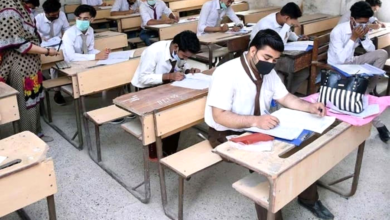The Rise of E-Learning in Pakistan in 2023

In recent years, Pakistan has witnessed a significant rise in the adoption of e-learning as a preferred mode of education. This shift has been fueled by various factors, including advancements in technology, increased internet penetration, and a growing demand for flexible and accessible learning options. With the potential to revolutionize the education sector, e-learning offers numerous benefits and opportunities for students and educators across the country.
In the past, traditional classroom-based education has been the primary mode of learning in Pakistan. However, with the advent of technology and the internet, the educational landscape has undergone a remarkable transformation. in this article, we will explore the rise of E-Learning in Pakistan in 2023. E-learning, also known as online learning, has emerged as a viable alternative, providing a dynamic and interactive platform for education.
Read more: How Technology is Changing Pakistan’s Education System 2023
The Current Educational Landscape in Pakistan

Pakistan faces several challenges in its education system, including limited access to quality education, inadequate infrastructure, and a shortage of qualified teachers. These challenges have hindered the progress of education in the country, particularly in remote areas where access to educational resources is limited. As a result, many students are unable to receive quality education and are deprived of the opportunities available to their urban counterparts.
The Emergence of E-Learning in Pakistan
Advancements in Technology
The rapid advancements in technology have played a pivotal role in the rise of e-learning in Pakistan. The increasing availability of affordable smartphones, tablets, and computers has made it easier for students to access online learning platforms. Additionally, the development of educational software and applications has created a rich ecosystem of digital learning resources.
Increased Internet Penetration
Another contributing factor to the growth of e-learning in Pakistan is the increased internet penetration in the country. With the expansion of 4G networks and the upcoming 5G technology, more people have access to high-speed internet, allowing them to engage in online learning activities seamlessly. This has bridged the gap between urban and rural areas, enabling students from all backgrounds to benefit from e-learning.
Benefits of E-Learning in Pakistan
Accessibility and Flexibility
One of the key advantages of e-learning in Pakistan is its accessibility and flexibility. With online courses and platforms, students can access educational content at their convenience, breaking free from the constraints of time and location. This is particularly beneficial for individuals who cannot attend traditional classrooms due to work commitments, family responsibilities, or geographical limitations.
Cost-Effectiveness
E-learning offers a cost-effective solution for education in Pakistan. Traditional education often involves expenses related to textbooks, transportation, and infrastructure. With e-learning, students can access educational materials online, reducing the need for physical resources. This affordability makes education more inclusive and allows a larger population to benefit from quality learning opportunities.
Diverse Learning Opportunities
E-learning provides students with a wide range of learning opportunities. Through online platforms, students can access courses from renowned institutions, both nationally and internationally. This diversity in learning resources allows students to explore new subjects, acquire specialized skills, and pursue their educational interests beyond the limitations of traditional curricula.
Challenges and Concerns in Implementing E-Learning

While e-learning brings numerous benefits, its implementation in Pakistan is not without challenges. It is crucial to address these concerns to ensure the effective integration of e-learning in the education system.
Infrastructure and Connectivity Issues
Pakistan faces infrastructure and connectivity challenges, particularly in rural areas. Limited access to electricity, unreliable internet connections, and a lack of necessary devices pose barriers to e-learning adoption. Addressing these infrastructure gaps and improving connectivity is essential to make e-learning accessible to all students across the country.
Quality of Content and Pedagogy
Ensuring the quality of e-learning content and pedagogy is crucial for its success. The availability of credible and up-to-date educational resources, well-designed courses, and interactive learning materials is essential to provide a meaningful learning experience. Collaborations between educational institutions and content providers can help maintain the quality standards of e-learning content.
Teacher Training and Support
Incorporating e-learning effectively requires adequate training and support for teachers. Educators need to adapt their teaching methodologies and acquire the necessary digital skills to deliver online education effectively. Providing professional development opportunities, workshops, and mentorship programs can empower teachers to leverage e-learning tools and platforms.
Government Initiatives and Support for E-Learning
Recognizing the potential of e-learning, the Pakistani government has taken various initiatives to promote its adoption. The Ministry of Federal Education and Professional Training has launched programs to improve the quality of e-learning content and enhance digital literacy among students and teachers. Additionally, partnerships with international organizations and collaborations with private institutions have further strengthened the e-learning ecosystem.
Impact of E-Learning on Students and Educators
E-learning has had a significant impact on both students and educators in Pakistan. For students, it has opened up new avenues for learning, allowing them to personalize their education and learn at their own pace. It has also enhanced collaboration and communication among students, breaking the barriers of traditional classrooms. For educators, e-learning has expanded their reach and provided opportunities for professional growth and innovation.
Future Trends and Opportunities in E-Learning
Looking ahead, the future of e-learning in Pakistan is promising. As technology continues to advance, virtual reality (VR), augmented reality (AR), and artificial intelligence (AI) are expected to play a more significant role in transforming the learning experience. These emerging technologies have the potential to create immersive and personalized educational environments, catering to the diverse learning needs of students.
Read more: The Best Role of Computers in a Connected World in 2023
Conclusion
The rise of e-learning in Pakistan has revolutionized the education sector, providing students with greater access to quality education and diverse learning opportunities. While challenges such as infrastructure limitations and content quality concerns exist, the government’s initiatives and support, along with continuous efforts to bridge the digital divide, are paving the way for a brighter future. E-learning is poised to transform education in Pakistan and empower students to thrive in the digital age.
FAQs
How can students benefit from e-learning in Pakistan?
E-learning offers students accessibility, flexibility, and diverse learning opportunities. It allows them to learn at their own pace, access quality educational resources, and explore new subjects beyond traditional curricula.
Will e-learning replace traditional classrooms in Pakistan?
E-learning is not meant to replace traditional classrooms but rather complement them. It provides an alternative mode of education that enhances accessibility and flexibility while retaining the benefits of face-to-face learning.
What steps is the Pakistani government taking to promote e-learning?
The government has launched various initiatives to promote e-learning, including improving the quality of content, enhancing digital literacy among students and teachers, and establishing partnerships with international organizations and private institutions.
How can infrastructure challenges be overcome for e-learning in rural areas of Pakistan?
Overcoming infrastructure challenges requires investments in electricity access, improving internet connectivity, and providing devices to students. Public-private partnerships and collaborations can play a crucial role in addressing these challenges.
What are the future trends in e-learning in Pakistan?
The future of e-learning in Pakistan will see the integration of emerging technologies such as virtual reality, augmented reality, and artificial intelligence. These technologies will create immersive and personalized learning experiences for students.











